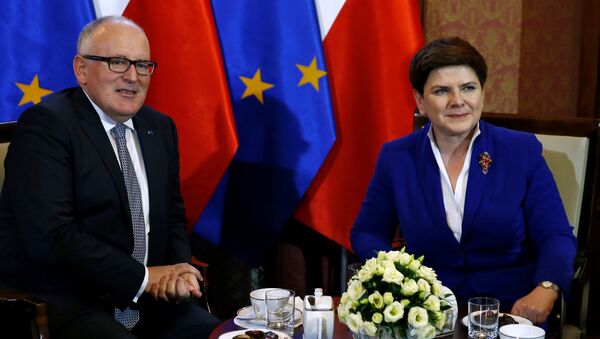In December 2015, the Polish Government added five "politically friendly" judges to the country’s Constitutional Tribunal, in a move seen by critics as making it easier to push through legislation with less opposition.
The amendment meant that the tribunal would need a two-thirds majority to take a decision on constitutional matters instead of a simple majority. The minimum number of judges needed to make a decision was also raised from nine to 13, making it more difficult to convene a quorum.
@HenryJFoy Complete non-event. Basically they agreed to tone down the rhetoric and continue plodding away. Solution as far away as before
— Pawel Swidlicki (@pswidlicki) May 24, 2016
The changes stated that there should be a six-month period before the tribunal can examine a case, rather than two weeks, which critics say allows the government to pass legislation that will go unchallenged for months.
However, Chief Justice Andrzej Rzeplinski ruled that many sections of the law passed in December 2015 were "non-compliant with the Polish Constitution. [The law] prevents the honest and proper functioning of the … Constitutional Court, by interfering in its independence and separation from other powers, thus violating the principles of the rule of law."
Under the Polish constitution a ruling does not become final until officially published. The government in Warsaw said it would ignore the ruling, refusing to publish it. The Council of Europe's Venice Committee said:
"A solution to the current conflict over the composition of the Constitutional Tribunal … must be found."
Media Clampdown
In January, the Polish parliament passed a new law that gives the government the power to directly appoint the heads of public broadcasters, which has been heavily criticized for being an effective clampdown on the independence of the media – a central tenet of membership of the union.
#RuleOfLaw: @TimmermansEU in #Poland today to continue constructive dialogue & look for solutions. https://t.co/XPuKzEnzyn
— Mina Andreeva (@Mina_Andreeva) 24 May 2016
The European Commission in January also launched an investigation because it believes the constitutional changes could break its "rule of law mechanism" which seeks to rein in EU member governments, whose policies and legislation are seen to pose a "systematic threat" to EU values – particularly on justice, democracy and media freedom.



